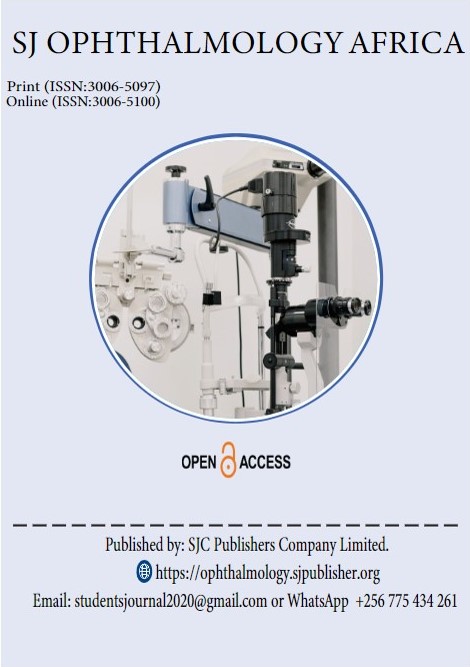MEDICAL-RELATED RISK FACTORS FOR AGE-RELATED MACULAR DEGENERATION AMONG PATIENTS ATTENDING EYE CARE CLINIC AT JINJA REGIONAL REFERRAL HOSPITAL. A CROSS-SECTIONAL STUDY.
DOI:
https://doi.org/10.51168/gr31ab30Keywords:
Medical-related risk factors, Ophthalmologists, Chronic disease, Macular DegenerationAbstract
Background:
Patients with AIDS have an increased age-adjusted prevalence of intermediate-stage AMD compared with that found in a non-HIV-infected cohort evaluated with similar methods suggesting a potential risk that AIDs and other medical conditions could have towards Age-Related Macular Degeneration. The study aims to assess the medical-related risk factors for Age-Related Macular Degeneration.
Methodology:
A Cross-sectional descriptive study utilizing quantitative data collection methods. The study population comprised all patients receiving eye care services for Age-related Macular Degeneration conditions at the eye unit of Jinja Regional Referral Hospital for a period of 6 months from October 2022 to March 2023. Non-probability sampling was used to select 50 participants.
Results:
Half 25/50(50%) of the total number of respondents were between 61-70 years and the minority 02/50 (04 %) were 31-40 years. Most respondents 21/50 (42%) were peasants while 10/50 (20%) were Business personnel. The majority 18/50(36%) Strongly agreed that cataracts are a risk factor for Age-related Macular degeneration, followed by 17/50(34%) respondents who agreed. More respondents 39/50 (78%) indicated they had an intra-ocular surgery than 11/50(22%) respondents had not had an intra-ocular surgery. Most respondents 28/50 (56%) indicated they had a chronic disease while 22/50 (44%) respondents did not. A higher number of respondents 31/50(62%) were HIV Positive than 19/50(38%) who were found to be HIV negative.
Conclusion:
The medical-related risk factors for Age-related Macular Degeneration were having HIV/AIDs, chronic systemic diseases, Cataracts, and intra-ocular surgeries.
Recommendations:
Similarly, Health workers especially ophthalmologists and ophthalmic clinical officers should provide health education to the patients and the public and carry out regular outreach for eye vision screening.
Downloads
Published
Issue
Section
License
Copyright (c) 2024 Joshua Tumwebaze , Taddeo Mulumba (Author)

This work is licensed under a Creative Commons Attribution-NonCommercial-NoDerivatives 4.0 International License.

